List
of Films
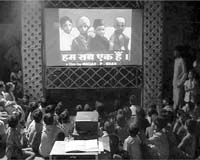 The Bond
(Naata) The Bond
(Naata)
Dir - K P Jayasankar and A Monteiro
Bombay/India, 2003 (45 min)
Naata is about Bhau Korde and Waqar Khan, two friends who work
on conflict resolution and communal amity initiatives between the different communities
in Dharavi, reputedly, the largest “slum” in Asia. Naata is the second in a series
of films on the people and city of Mumbai, and is a sequel to Saacha (The Loom),
2001. [more
info]
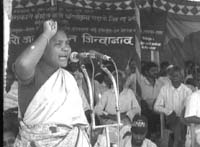 Development Flows from Development Flows from
the
Barrel of the Gun
(Vikas Bandook Ki Naal Se)
Dir-Biju Toppo and Meghnath
India, 2003 (54 min)
The film gives voice to people affected by development projects—and
repressed by the state for speaking out. The film asks why most of these incidents
have taken place in areas where indigenous Adivasi people are majorities, and
leaves us to ask why, in the age of globalization, the state has turned from
protector to predator. [more
info]
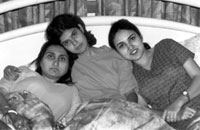 Don't
Ask Why Don't
Ask Why
Dir - Sabiha Sumar
Pakistan, 2003 (58 min)
At 17,
Anousheh is at an age where daughters are usually married off, but
she wants to study and refuses to accept the restrictions her religion
and culture have imposed on her. It causes conflict with her mother
and lengthy discussions with her father. This film follows Anousheh
as she struggles to realise her dreams and cope with her share of
disappointment.
[more
info: SF + S. Bay]
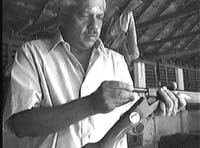 The 18th
Elephant The 18th
Elephant
3 Monologues
Dir - P. Balan
Kerala/India, 2003 (62 min)
This film is a critique of modern man’s mercenary attitude
towards nature and his anthropocentric conception of development. The
sad plight of the elephant in both its wild and domesticated states exposes
how such behavior brings death and wreaks havoc on the lives and habitats
of other species. [more
info]
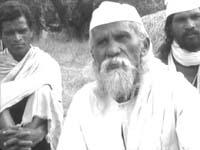 The Fire Within (Buru Sengal) The Fire Within (Buru Sengal)
Dir - Shriprakash
Jharkhand/India, 2002 (57 min)
The land of the Tana Bhagats in Jharkhand, India, a peaceful sect
of the Oraon tribe who follow a Gandhian lifestyle and philosophy, is today besieged
by Naxalite violence. The film touches upon corruption, the mafia, energy politics
and displacement of villages, and tribal identity in an area where coal has been
mined for the last 150 years. [more
info]
 For
a Place Under the Heavens For
a Place Under the Heavens
Dir - Sabiha Sumar
Pakistan, 2003 (53 min)
This film traces traces the relationship of Islam to the state in an
effort to understand how women are coping with and surviving the increasing
religiosity of civil and political life in their country. Juxtaposing
interviews with Pakistani women who have chosen to veil themselves, even
in the absence of any state directive to do so, with observations from
their feminist colleagues who cling to hope for a more secular system,
Sumar dramatically captures the tension between liberal and fundamentalist
forces that are shaping life in contemporary Pakistan. [more
info]
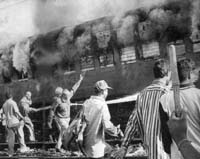 Godhra Tak: The Terror Trail Godhra Tak: The Terror Trail
Dir - Shubradeep Chakravorty
Gujarat/India, 2003 (60 min)
The film investigates the Godhra train burning and
subsequent rioting that killed 3,500 Muslims in Gujarat, India
in February, 2002. It retraces the route of the first batch of
karsevaks from Gujarat to Ayodhya (where Hindu fundamentalists
want to build a Ram temple) and back, and documents the terror
they unleashed en route, and the incident at Godhra railway station. [more
info]
 History
for Winners History
for Winners
(Itihaas Jitneharuka Laagi)
Dir - Pranay Limbu
Nepal, 2003 (55 min)
An award-winning singer makes a desperate but unsuccessful
attempt to make a comeback after being in musical hibernation for seven
years. Itihaas Jitneharuka Laagi portrays the changes in the Nepali music
scene, as represented by Kuber Rai and Dhiraj Rai. The two singers are
a study in contrasts, with their diametrically opposing personalities
and attitude towards music. [more
info]
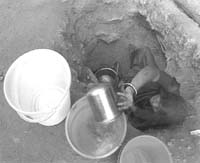 Hunting
Down Water Hunting
Down Water
Dir - Sanjaya Barnela and Vasant Saberwal
India, 2003 (32 min)
India’s present water crisis is of its own making.
The patterns of water use are changing, with increased cultivation
of water-intensive cash crops. But there are other changes that
defy logic, such as the growing number of private swimming pools
in cities, rain dances and water amusement parks. As a consequence
more and more of the rural poor are now forced to migrate. [more
info]
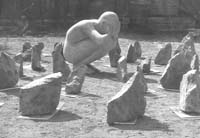 Made in India Made in India
Dir - Madhusree Dutta
India, 2002 (39 min)
A rural artist paints her autobiography, images of Bollywood
movie icons are erased after a week-long run of their films, the national
flag flutters on 150 kites, installation artists paint pop icons on the
rolling shutters of shops. Symbols of nationalism become a fashionable
commodity. Made in India is about contemporary visual cultures in India. [more
info]
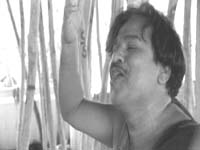 A Night
of Prophecy A Night
of Prophecy
Dir - Amar Kanwar
India, 2002 (77 min)
A Night of Prophecy was filmed in several diverse regions
of India (Maharashtra, Andhra Pradesh, Nagaland, Kashmir) and features
music and poetry of tragedy and protest performed by regional artists.
The sources of anger and sorrow vary from inescapable, caste-bound poverty
to the loss of loved ones as a result of tribal and religious fighting.
The footage is a stunning glimpse of India’s diverse ethnic groups
and topography from the rural mountains to its crowded urban centers. [more
info: SF + S.
Bay]
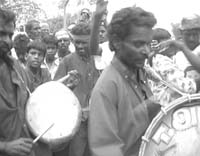 Resilient
Rhythms Resilient
Rhythms
Dir - Gopal Menon
India, 2002 (64 min)
India’s caste system places nearly 160 million people,
the dalits, at the outskirts of society. It exploits their services but
at the same time denies them acceptance as human beings. Resilient Rhythms
deals with a range of dalit responses to their marginalization, from
armed struggle to electoral politics. [more
info]
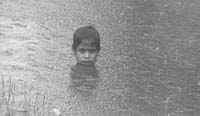 Sand and Water Sand and Water
Dir - Shaheen Dill-Riaz
Bangladesh, 2002 (105 min)
The middle section of the Jamuna, one of the three main
rivers in Bangladesh, is called “the deadly paradise”. Sand and Water
shows how the people of the islands here live in the most extreme natural
conditions and cope with the “moods” of Jamuna, which also provides them
with their livelihood and fertile islands. [more
info]
 Skin
Deep Skin
Deep
Dir - Reena Mohan
India, 1998 (83 min)
Skin Deep
is an exploration of body images and self perception among contemporary
urban, middle class women in India. The film traces the dynamics
of the eternal search for the ideal femininity and how it permeates
the self-image of contemporary women. It is a playful, engrossing
and articulate film on women's complicated and contradictory relationships
with their bodies. [more
info: SF + S. Bay]
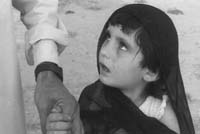 Swara - A Bridge over Troubled
Water Swara - A Bridge over Troubled
Water
Dir- Samar Minallah
Pakistan, 2003 (40 min)
Swara examines and comments on the Pakhtun practice, in
northwest Pakistan, of giving minor girls in marriage as reparation for
serious crimes such as murder committed by their fathers, brother, or
uncles. [more
info]
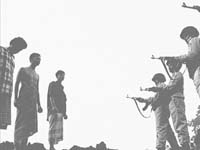 Tale of
the Darkest Night Tale of
the Darkest Night
(Shei Rater Kotha Bolte Eshechi)
Dir - Kawsar Chowdhury
Bangladesh, 2001 (43 min)
The film tells the story of the killings by the Pakistani army
in Dhaka University. Surviving members and witnesses speak, and bring alive
the havoc of that night. The documentary also includes the wireless messages
the Pakistani army exchanged that night. [more
info]
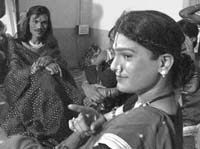 The Unconscious The Unconscious
Dir - Manisha Dwivedi
Maharastra/India 2003 (19 min)
This film is a journey with men who call themselves kothi.
They are men for their families and society, but for themselves they
are women, and wives of other “macho” men. They walk two tightropes,
both of fear and disgrace of and for their families and ‘husbands’. And
yet, they celebrate womanhood in their world of disguises. [more
info]
 Voices
of Dissent Voices
of Dissent
Dir - NoorKhan S. Bawa
Pakistan, 1999 (22 min)
This film
explores the passion of dance within a number of contemporary Pakistani
contexts and the personalities that pursue it: a classically trained
kathak dancer who, as a woman, has been forbidden by the Pakistani
government to perform her craft on stage; a male kathak dancer ridiculed
for pursuing a traditionally female dance form; a popular film actress
who embodies the commercialization of what was once a sacred; and
a mullah speaking for the fundamentalist position. [more
info]
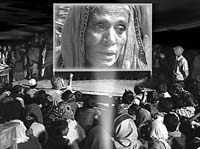 Words
of Freedom Words
of Freedom
(Muktir Kotha)
Dir - Tareque & Catherine Masud
Bangladesh, 1999 (80 min)
This film
is about a group of young men and women who begin traversing the
far corners of Bangladesh to show Muktir
Gaan, a documentary on the Bangladesh Liberation War, and how
it rekindled the painful memories of ordinary people, and prompted
them to speak of the dreams they once had for their country. It is
a testament to the struggle still raging in the countryside, a struggle
for a more just and democratic society - this was the dream of the
liberation. [more
info]
|

